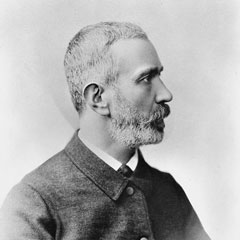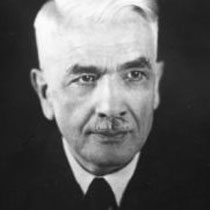


Karl August Bleyle
Karl August Bleyle
lived from * 07.05.1880 to †06.05.1969,
married to Adele Szantner (manufacturer's daughter), they had a daughter.
In 1897 studies in the royal conservatoire in Munich
In 1899 entry into the military band of the archduke's Rainer regiment No. 59 in Salzburg
In 1903 resignation as a military musician
In 1904 study in Munich (teacher: Ludwig Thuille); contacts with Richard Strauss
In 1908 premiere of the "Flagellantenzuges" under Felix Mottl
In 1914 marriage with Adele Szanter; Übersiedelung to Graz
In 1917 Bleyle becomes a Korrespetitor in the court theatre in Weimar and stays afterwards in Graz, Laibach and Veldes
In 1920 return to Stuttgart as a free lance composer
In 1955 lending of the title "Professor"
In 1966 lending of the salary cross 1st class of the BRD
In 1969 Karl Bleyle dies on the 5th of June in Stuttgart
In the parental home of young Karl was made music diligently and woken up quite early in him the joy in the music. He received his first music lessons on the violin from the field sexton chief conductor Karl Linke, who came from the Hungarian Barth field and had been appointed in 1888 as a teacher to the anew established music school in Feldkirch. Karl moved at the age of nine years with his parents to Stuttgart. In the Conservatory he received in 1894-1897 his first lessons in music theory and counterpoint with Hugo Wehrle and Samuel de Lange and in 1897-1899 with Edmund Singer. After the military service his music studies led him in 1904-07 to Ludwig Thuille to Munich where he lived till 1919 as a composer.
Already in his first year in Munich composed Bleyle his 1st Symphonie in C minor, which premiered on 7th of December, 1905 in Stuttgart by the court orchestra and was highly praised by the press. On the 25th of February, 1910 played the Munich concertmaster Bruno Ahner whose Violin Concerto in C major op.10 in concert of the Musical Academy. After fertile compositional years in Cannstatt (1919-1923) and Stuttgart he moved to Graz (Austria), where his first opera "The devil bridge", a Requiem and the "Trilogy of Passion" emerged. Another station in his life was the National Theatre of Weimar whose musical management he held during two years. After a short stay in Velde he moved back to Stuttgart, where he worked until his death. He never filed his Austrian citizenship from attachment to his hometown Feldkirch.
„Symphonie Nr. 1 in c-Moll“ (1904/05)
„Symphonie Nr. 2 in F-Dur, op. 6“ (1906)
„Flagellantenzug“, op. 9 - Sinfonische Dichtung (1907)
„Konzert für Violine und Orchester in C-Dur, op. 10“ (1908)
„Gnomentanz“ (1909)
„Höllenfahrt Christi“ (1910)
„Chorus mysticus“ (1910)
„Ein Harfenklang“ (1910)
„Prometheus“ (1912)
„Trilogie der Leidschaft“
„Requiem“
„Der Teufelssteg“ - Oper
„Der Hochzeiter“ - Oper
„Sonate für Violine und Klavier, G-Dur, op. 38“ (1923)
„Konzert für Violoncello und Orchester in d-Moll, op. 49“ (1934)
„Minnelieder nach Heinrich von Morungen, op. 44“ (1936)
„Schneewittchen-Suite, op. 50“
„Bacchanten-Ouverture, op 52“ (1937)
„Sonate für Violine und Klavier in e-Moll, op. 56“ (1943)